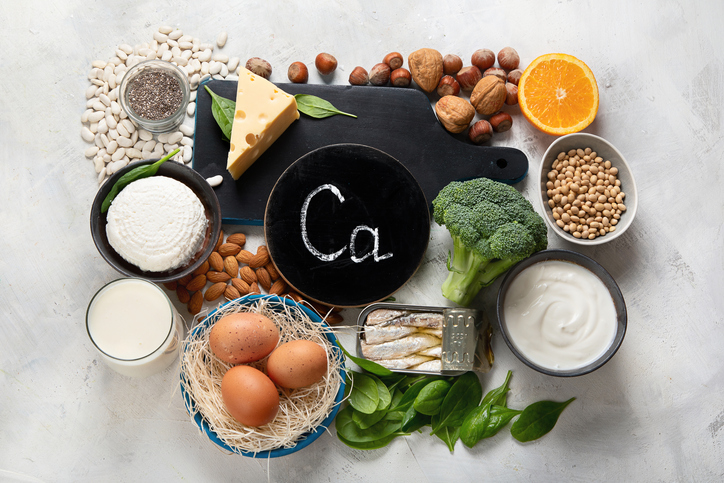Are You Vegan or Vegetarian? Be Mindful Of Your Bones

By Joy Stephenson-Laws, J.D., Founder
It’s no secret that eating plenty of plants, fresh fruits and vegetables, is usually a good way to maintain a healthy daily diet. Some people even follow plant-based diets, meaning they maintain a vegan or vegetarian diet.
Although these fruit and veggie friendly diets are generally considered healthy (because they tend to eliminate a lot of processed foods and are nutrient-dense), we still have to remember that whole food groups, such as meat and dairy, are eliminated.
This isn’t to say that everyone should eat meat and dairy products, but if you are someone who chooses to be completely or mainly plant-based, you really have to make sure that you are getting an adequate amount of all the necessary nutrients.
Generally, our bodies require six groups of nutrients to stay healthy: water, carbohydrates, fats, vitamins, minerals and protein. And we need the right balance of each of these nutrients to remain healthy.

In my opinion, vitamins and minerals are on a different level. What I mean by this is that most people who have access to food and clean water are usually able to avoid a water, carbohydrate, protein or fat deficiency. But vitamin and mineral deficiencies are actually quite common even if you overeat (and so many Americans have nutritional imbalances).
There are many different vitamins and minerals that are essential to our overall health and wellness, including magnesium, phosphorus, calcium, potassium, vitamin C, vitamin A, vitamin D, B vitamins and more.
It's a lot to keep up with, but it's necessary!
If you choose a plant-based diet, it’s important to be very proactive about making sure you get these two key nutrients: vitamin D and calcium.
As you may already know, these nutrients are key for bone health. With vitamin D, we mainly get this nutrient from exposure to the sun. But animal products such as milk are often fortified with vitamin D.
Although there are many plant foods such as spinach and broccoli that contain calcium, you may be more inclined to think of calcium coming from animal foods such as milk, cheese and yogurt. Plant or animal, these are all viable sources of calcium, but according to a recent study, plant-based diets can be detrimental to bone health if there is not an adequate intake of vitamin D and calcium.
The study was conducted in Finland and examined 136 adults who followed one of the three diets outlined below (per this recent Medical Xpress report discussing the study):
- An average Finnish diet, about 70% animal-derived protein of total protein, while most of the plant-based protein came from cereal products
- Half of the protein was derived from plant products and the other half from animal products
- 30% animal protein and 70% plant-based protein of total protein
The study participants followed one of these three diets for 12 weeks. It is important to note that all three diets included the same amount of fish and eggs.
“Sources of animal protein, both red and white meat as well as dairy products, were partially replaced with plant-based proteins by adding a diverse range of legumes, nuts, seeds, and cereal products in the diets,” according to the report.
“Fluid dairy products, which are fortified with vitamin D in Finland, were partially replaced with plant-based drinks not fortified with calcium or vitamin D. The amount of cheese was lower in the diets which contained more plant-based protein compared to the diet rich in animal protein.”
The results?
“The researchers found that both bone formation and resorption increased when part of the animal protein in the diet was replaced with plant protein, which may in the long term be detrimental to bone health,” according to the Medical Xpress report.
“The researchers suggest the changes in bone metabolism as well as calcium and vitamin D intakes are probably caused by the low amount of dairy products and, consequently, the low amount of calcium and vitamin D consumed.”
It is important to note that the study participants were not allowed to take supplements.
Additional studies have also shown that plant-based diets may come with an increased risk of bone fractures. One study from University of Oxford found evidence which suggested that vegans may have a 43% higher risk of bone fractures than meat-eaters.
This isn’t to say that you cannot be vegan or vegetarian, but it is important to avoid nutritional deficiencies and imbalances. The best way to stay nutritionally balanced is to take routine nutrient tests in order to definitively determine where you stand. If the test reveals that you are not nutritionally balanced, a competent healthcare professional can work with you on making the necessary dietary changes and recommend quality supplements if necessary.
Finally, whatever diet you choose to follow, be sure to get the approval of a competent healthcare professional, especially if you are pregnant, breastfeeding or have any existing health issues.
Enjoy your healthy life!
Disclaimer: This article is not intended to provide medical advice. Please consult with your doctor or another competent healthcare practitioner to get specific medical advice for your situation.
The pH professional health care team includes recognized experts from a variety of health care and related disciplines, including physicians, attorneys, nutritionists, nurses and certified fitness instructors. This team also includes the members of the pH Medical Advisory Board, which constantly monitors all pH programs, products and services. To learn more about the pH Medical Advisory Board, click here.







